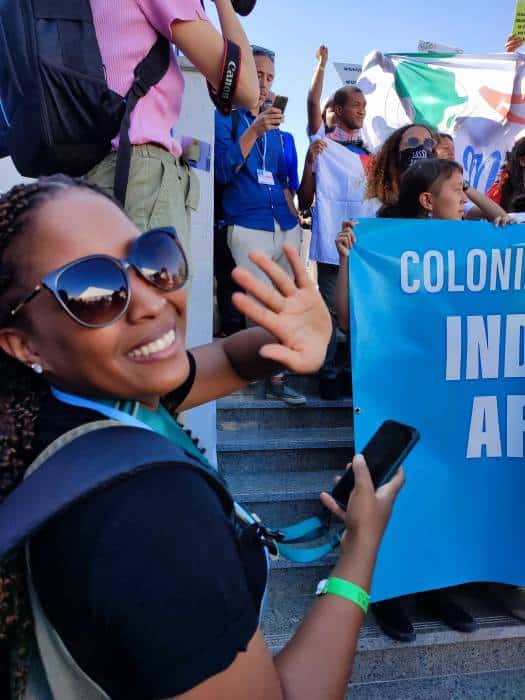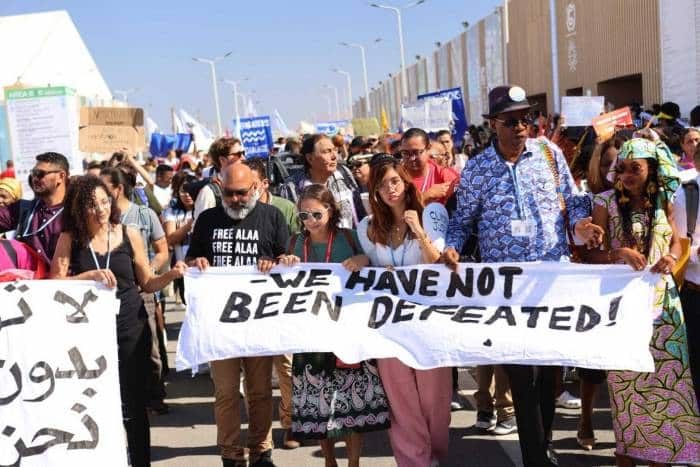This is my first time at a UN climate conference – and here’s how it looks through my eyes.
First things first. My name is Boitumelo Masipa – but I often go by Tumi. I’m here at COP27 in my role as 350.org South Africa’s digital and communications specialist. During the two weeks of COP, I’m working closely supporting my colleagues from the South Africa team, our region-wide 350 Africa campaigners, and the grassroots and activists across the continent.

Boitumelo Masipa of 350.org Africa at the COP27 in Egypt
What does a digital comms person do at COP? A lot of different things: from covering various actions, recording videos, writing articles, and reporting on social media, to designing promo materials for events and actions.
But I think that my most important role here at COP27 is to help people tell their stories. COP27 is also called “the African COP”. For my team, one of the most important reasons to come to COP27 was to be able to share with people the stories of African communities and activists who are fighting for climate justice. We hope to connect with people from across Africa by showing them people who look like them, who face the same struggles, who speak the same language, and who dedicate their lives to the fight for climate justice.
Each day at COP27, my main focus is to capture and uplift the stories of African grassroots activists, representing different campaigns, struggles and communities. To give them a platform to speak to others across Africa – with the help of social media channels, video and writing. To convey to a broad audience the experiences, creativity and power of our movement.
I started this morning later than usual – it’s Saturday, so there’s less going on early in the morning, and our daily team briefing started at 9:00 am instead of 7:30, so we could sleep in a little. After breakfast, I had some time to work on my laptop before other folks from the 350.org delegation and I headed to the conference center.
This is my first time at a UN climate conference. Before we all came to Sharm el-Sheikh, my colleagues who have been to previous COPs told me to beware of the “COP high” – that’s when everything seems exciting and more important than rest.
I didn’t expect how easy it is to get sucked in and pulled in so many different directions, running from event to event, from meeting to meeting. So I try to be very intentional with my focus, and stick to my key priorities (usually!). 😆
There are two main campaigns that my team and I are focusing on. The first one is about pushing public institutions across Africa to advance the energy transition towards renewables. At COP27, the 350 South Africa team hosted a special side event, where we launched a report we co-wrote with a number of partners from the Fair Finance Coalition of Southern Africa, calling for more transparency and more involvement of local communities in planning their energy futures.
The campaign against the East African Crude Oil Pipeline (#StopEACOP) is my other main priority. At COP27, we’re spotlighting and supporting activists from Uganda, Tanzania, Kenya, Congo and all across Africa in the fight against this terrible oil project.
Throughout this whole first week of EACOP, I supported my colleagues in setting up and promoting our side exhibit. Today I went there for the week’s final screening of our recent EACOP documentary – the Crude Reality. It felt really great to be able to share the real story of communities resisting EACOP to delegates at COP.
But the main event of the day was the huge civil society march and rally inside the COP27 conference center. Activists and campaigners from many civil society constituencies came together under the banner “We are yet not defeated”, demanding reparations, justice, human rights – and for polluters to be kicked out of COP.
It was a powerful action, with so many lively and diverse groups from across Africa and the world. Usually, at marches like this, I have a lot of fun running with my camera to get in front of the column or stretching under people’s arms to get the right angle.

Civil society march at COP27 in Egypt under the banner “We are not yet defeated”
But today’s action felt different – and like most things at COP, it was not what I thought it would be. I saw photos and videos from last year’s COP26 in Glasgow. There was such freedom and creativity in how people gathered to take action and raise their voices for climate justice – safe from prosecution. Here, it feels so much less free, so much more restricted. There are so many rules to follow, things we can’t say openly for fear of being told to leave the COP.
I didn’t expect that. I thought COP would be a much more lively, activist-driven space. I wanted it to feel like a festival for climate justice – and that’s not what COP27 is.
But while restrictions mean that we can’t take our protest to the streets and speak about our stories and our demands openly, we can do that online, digitally, on social media, and via email.
Before I came to Egypt, my family were teasing me that I would be negotiating climate agreements and sitting in the same room as world leaders. That’s not my job – but I think, in some ways, for some folks, the work I do here is equally important.
I’m grateful to be able to offer hope, and a feeling of being seen and heard, to people from across the African climate movement who keep fighting for climate justice. Sometimes it can feel so isolating, so hopeless, and so hard. But here at COP, grassroots activists who speak for their communities get the chance to tell their stories, connect with others, to be heard at this important event on their home soil.
My hope for them, and the reason I’m here, is to help those on the frontline of the fight for climate justice to feel uplifted, energised, and inspired. Because the main slogan of today’s march at COP is right – we keep fighting. We are not yet defeated.
Thanks for reading!
Tumi for 350.org Africa